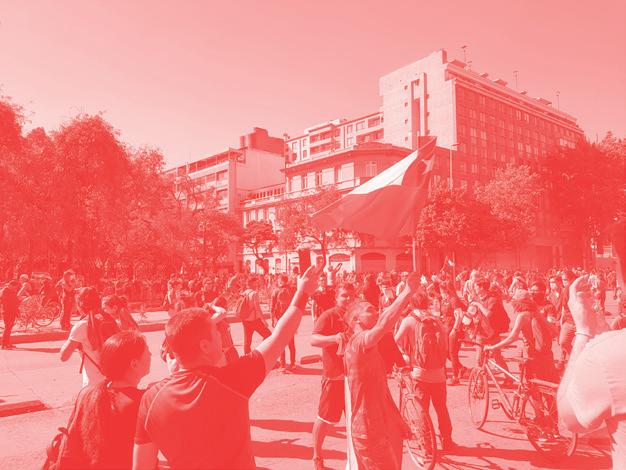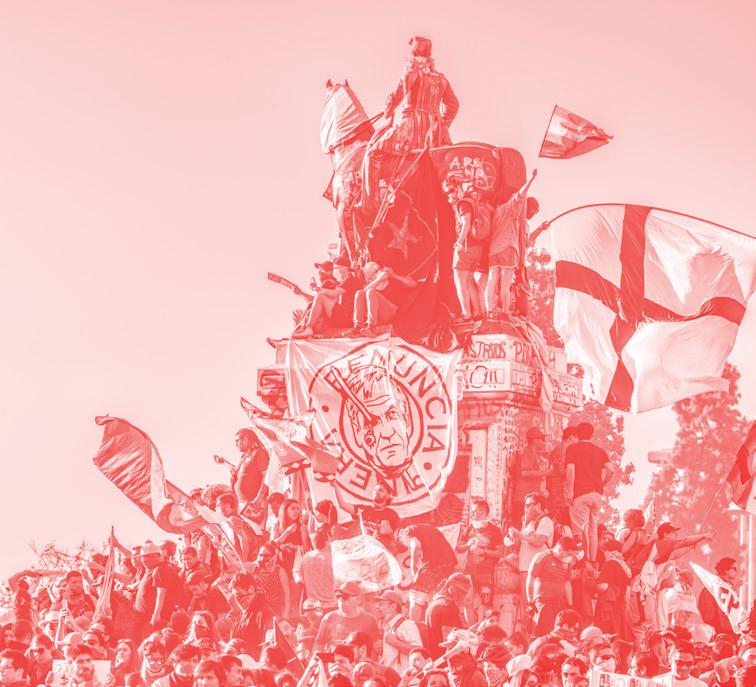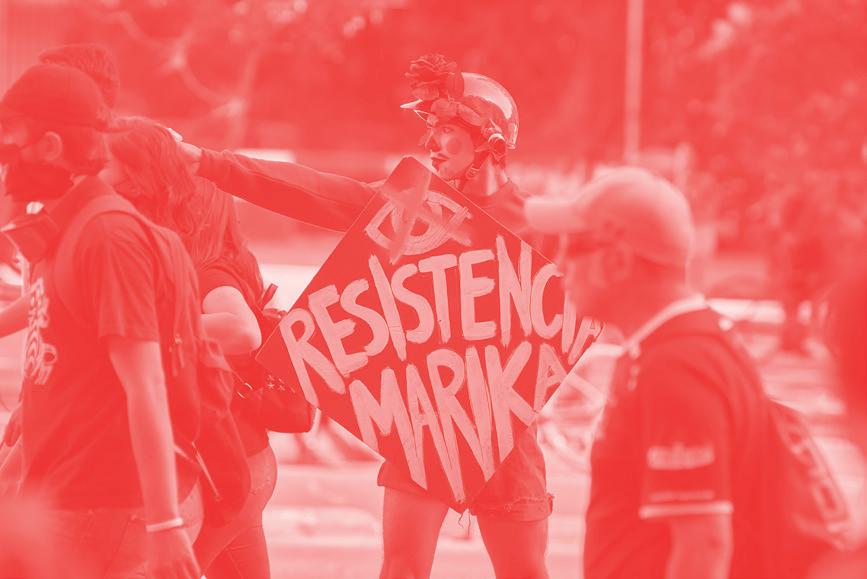
8 minute read
The Chilean Protests
T HE CHIL EAN
by H Lawrence Lower Sixth
Advertisement
PROT ES TS
Rebellion in the form of protests often makes the headlines... until the next day when the next story pushes it further down the page, and further into the backs of our minds. This was the same case as the protests in Chile when they first broke out on the 14 October 2019. Upon discussion with one of my Spanish teachers from Chile, I understood the real impact of the protests on the country.
Ha habido problemas políticos en Chile desde la dictadura que terminó en 1990. A pesar del hecho de que el país se haya convertido en una democracia, muchos chilenos sienten que el gobierno no los representa y que sus derechos están siendo violados.

There have been political problems in Chile since the dictatorship, which finished in 1990. Despite the fact that the country had become a democracy, many Chilean people feel that the government doesn’t represent them and that their rights are being violated.
Muchas personas no tienen acceso a recursos básicos y esenciales porque después de la dictadura el gobierno empezó a privatizar los recursos naturales que ha hecho mucho más difícil para los chilenos pagarlos: Chile fue el primer país en el mundo privatizar el agua. Las personas sienten que esto va en contra de lo que el gobierno prometió originalmente.
Many people do not have access to basic resources and essentials because after the dictatorship, the government started to privatise natural resources, which has made it much more difficult for people to afford them: Chile was the first country in the world to privatise water. People feel that this goes against what the government originally promised.
Además, muchos chilenos no ganan bastante dinero y no pueden pagar el costo de vida - $500.000clp cada mes más o menos - y actualmente, el salario medio es aproximadamente $301.000clp. Una empresa privada maneja también las pensiones de las personas y es ilegal para las personas acceder a estos ahorros aún si presentan serio problemas económicos.
Furthermore, many Chileans do not earn enough money and cannot afford the living costs - roughly CLP$500,000 per month - and the median salary is currently CLP$301,000. A private company also manages people’s pensions and it is illegal for people to access these savings even if they are struggling financially.
También, se está luchando por el sistema educativo - hay una gran brecha entre los colegios privados y aquellos que son públicos - tal como el sistema de salud; muchos chilenos no pueden tener una cita al doctor y algunos están muriendo mientras esperan por su cirugía.
The education system is also struggling - there is a big difference between private and state schools - as well as the health system; many Chileans are not able to book doctors’ appointments and some are dying while waiting for surgery.

Aunque el antedicho ha causado una acumulación del resentimiento hacia el gobierno, el acontecimiento específico que provocó el inicio de las manifestaciones en el pasado mes
de octubre fue su decisión aumentar al precio del metro que ha hecho casi imposible para los chilenos pagarlo debido a los sueldos bajos. El enfado fue acentuado por el hecho que muchas personas ya estaban descontentas porque el metro fue privatizado. El aumento del precio llevó a chilenos saltando los torniquetes sin pagar y las protestas empezaron en Santiago (la capital). Como resultado, el caos comenzó - la policía y las fuerzas armadas se involucraron y el presidente declaró un toque de queda. En total 80/130 estaciones fueron gravemente dañadas. Algunas personas creen que la policía y el gobierno fueron responsables por algunos de los daño como parte de una conspiración contra la gente. Ahora, en febrero, la violencia sigue en desarrollo con la policía usando gas lacrimógeno ilegal y disparando a los manifestantes en los ojos.

Although these things have caused a build-up of resentment towards the government, the specific event that triggered the October 2019 protests was the decision to increase the price of the Metro, which made it unaffordable for people due to the low salaries. The anger was also accentuated by the fact that many people were already unhappy that the Metro was privatised. This led to people jumping the turnstiles without paying and protests broke out in the capital Santiago. As a result, there was chaos - the Police and military got involved and the president declared a curfew. In total, more than half of the 130 stations were seriously damaged. Some people believe that the Police and government were responsible for some of this damage as a complot against the people. In February 2020, the violence was ongoing with the Police using illegal tear gas and shooting protesters.
Below are some of my teacher’s responses to the questions I asked. Although, the first one was answered by my teacher’s partner who has been working as a voluntary nurse. ¿Cómo es vivir en Chile actualmente?
What is it like to live in Chile at the moment?
No es normal y hay mucha violencia - los viernes son peor, en particular porque la gente va a ‘Plaza Dignidad’ - y durante las protestas es muy difícil respirar debido al gas lacrimógeno y muchas personas están sufriendo de quemaduras, y problemas respiratorios. Además, a pesar de llevar ropa protectora, gafas y máscaras es difícil ver y mi equipo y yo hemos hace unas semanas fuimos atacados y cegados producto del gas. Muchos servicios públicos también no están funcionando debido a las protestas.

It is not ‘normal’ and there is a lot of violence - Fridays are particularly bad because people go to ‘Plaza Dignidad’ - and during the protests it is very difficult to breathe due to the tear gas and many people are suffering from burns and respiratory problems. Furthermore, despite the protective clothing, goggles and mask, it is hard to see. My team and I were attacked and momentarily blinded by the gas a few weeks ago. Also, many public services are not running due to the protests.
Pienso que todo el mundo ha cambiado completamente. Muchos chilenos ahora están sin trabajo y hay muchas huelgas planeadas. Se supone que debo terminar la universidad en diciembre; sin embargo, si las protestas continúan, terminaré en el verano o más tarde. Va a ser extraño andar en las calles que se han quemado y destrozado - es triste pensar que muchos lugares que conozco bien serán distintos cuando vuelva. También nadie ha pensado en las consecuencias a largo plazo. Por ejemplo, la economía será más afectada de lo que esta que es ahora. El valor del dólar es muy alto actualmente entonces las cosas se convertirán más caras y más personas perderán sus trabajos. No me sorprendería si la economía se convirtieran como es en Argentina. El próximo año tenemos elecciones y será interesante ver qué sucederá. Como un futura profesora estoy muy preocupada porque era difícil encontrar un trabajo antes de llegar Inglaterra y ahora será aún más difícil. También los sueldos no son buenos. En conjunto, sí, creo que Chile será muy distinto cuando vuelva a mi hogar.

I think that everything will have completely changed. Many people are unemployed and there are lots of strikes planned. I am supposed to be finishing at university in December; however, if the protests continue, I will finish in the summer or later. It is going to be strange walking through streets which have been burnt and vandalised - it is sad to think that many places I knew well will be different when I return. Also, no-one has thought about the longterm consequences. For example, the economy will be more affected than it is already. The value of the dollar is currently very high so things will become more expensive and people will lose their jobs. It would not surprise me if the economy becomes more like the Argentinian economy. Next year we have elections and it will be interesting to see what happens. As a future teacher I am very worried because it was already difficult to find a job before I came to England but now it will be even harder. The salaries are also not good. All in all, yes, I think that Chile will be very different when I return home.

¿Piensas que las protestas harán una diferencia? ¿Es vale la pena?
Do you think that the protests will make a difference? Is it worth it?
Aunque las protestas han funcionado bien en el pasado en Chile - un ejemplo significativo es la ‘Revolución de los Pingüinos’, que fue sobre la educación - creo que hoy en día la situación es completamente distinta. Los chilenos han protestado por casi seis meses ahora y lo único que ha cambiado es el precio del metro que ahora es el mismo de hace ocho meses atrás, lo cual es ridículo y una vergüenza. Entonces, en este momento, protestar es peor porque la gente se enfada y están protestando con ira que no está trayendo cambio positivo.
Although protests have worked in the past in Chile - a significant example being the ‘Revolución de los Pingüinos’, which was about education - I think that nowadays the situation is completely different. People have been protesting for almost six months now and the only thing which has changed is that the price of the Metro is now the same as it was eight months ago, which is ridiculous and a

shame. Therefore, at the moment protesting is worse because people are very angry and are protesting with rage which is not bringing about positive change.








